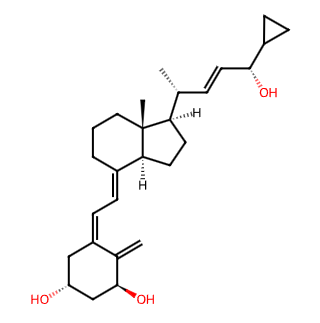- Synthetic anti-infective drugs
- Medications for the digestive system
- Antipyretic and analgesic drugs
- Medications for the blood system
- Medications for the respiratory system
- Anti-allergic drugs
- Medications for the urinary system
- Diagnostic medications
- Immunosuppressive and immunomodulatory drugs
- Vitamins and mineral supplements
- Antioxidants and medications for osteoporosis
- Antiparasitic drugs
- Ophthalmic medications
- Amino acids and their derivatives
- Dermatological medications
- Medications for the circulatory system
- Antitumor drugs
- Medications for the nervous system
- Hormonal and endocrine function-regulating drugs
- Antibiotics
- Others
CAS No.: 112965-21-6




Calcipotriol
Calcipotriol is a vitamin D analog, with its main component being calcipotriol, and it does not contain any hormonal ingredients. It is commonly used in the treatment of various skin conditions, particularly psoriasis and neurodermatitis.
I. Basic Information
English Name: Calcipotriol
Cas Number: 112965-21-6
Molecular Formula: C27H40O3
Molecular Weight: 412.6
II. Functions and Effects
1. Inhibition of Skin Cell Proliferation
Calcipotriol effectively inhibits excessive proliferation of epidermal cells, reducing the number of keratinocytes. This action helps to improve skin conditions caused by excessive cell proliferation, such as psoriasis.
2. Induction of Cell Differentiation
Calcipotriol influences the expression of specific transcription factors, thereby regulating related genes and promoting the transition of keratinocytes from the proliferative phase to the mature phase. This process aids in restoring normal keratinization and improving abnormal proliferation and differentiation in skin lesions, such as those seen in psoriasis.
3. Modulation of Immune Response
Calcipotriol also modulates the immune response. It reduces autoimmune attacks on the skin, decreasing the degree of inflammation. Additionally, calcipotriol promotes T-lymphocyte apoptosis and enhances natural killer cell activity, thereby strengthening the immune system and having a therapeutic effect on autoimmune skin diseases like psoriasis.
4. Anti-inflammatory Effects
As a derivative of vitamin D, calcipotriol regulates calcium and phosphorus metabolism in the body and exerts anti-inflammatory effects through multiple pathways. It blocks inflammatory signaling pathways mediated by T-cells, achieving an anti-inflammatory effect and thereby alleviating symptoms such as local itching.
5. Inhibition of Calcineurin
Calcipotriol also inhibits the activity of calcineurin, reducing excessive proliferation of skin cells. This mechanism further enhances its efficacy in treating skin diseases like psoriasis.

Tai Yau Street, San Po Kong, Kowloon, Hong Kong, China.



